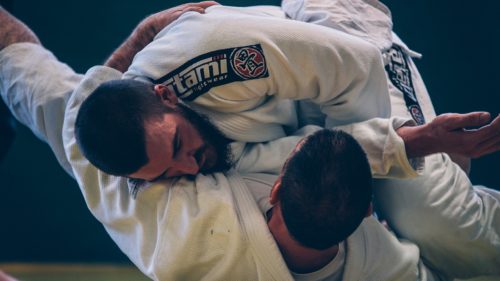Advertisements
While MMA has become a spectator sport producing huge pay-per-view events and big stars, BJJ has remained humble. At the first UFC in 1993, the brazilian jiu jitsu was introduced to the world. Royce Gracie, a modestly built 27-year-old who weighed in at 175 pounds, dominated the tournament, using a simple but devastating wrestling system to subdue a cadre of unwilling fighters. In the intervening years, Gracie became a household name among MMA enthusiasts. His dominance of the sport – in 2003, he was inducted into the UFC Hall of Fame – catalyzed the rise of the brazilian jiu jitsu as the fastest growing martial art in the world, helping the Gracie family enter legendary status in places far from their home in Rio de Janeiro. But after years of growing popularity around the world, that's finally starting to change.

Advertisements
The recent emergence of serious prizefighting has taken center stage in BJJ, giving blue-collar athletes the opportunity to choke each other for big checks. Franchises like Polaris, Metamoris, The Eddie Bravo Invitational, Copa Podio and others seek to instill the sport with a greater air of professionalism. Some organizers are cooking up grand schemes to put BJJ on a level playing field with mainstream sports garnering airtime on ESPN, but the road to success has been paved with setbacks and sometimes questionable business acumen.
Advertisements
For Eddie Bravo, a legendary if divisive figure in the BJJ world, the sport has never lent itself to entertainment. "The reason why there has been no money in brazilian jiu jitsu It's because it's been boring," he says. For his part, Bravo has a point: Watching two competitors compete for chokes and blocks in a traditional match can often feel like a laborious, sweat-drenched hugging contest that won't force fans to buy tickets en masse or tune in to through pay per view.
In an attempt to make the sport more enjoyable for viewers outside of the BJJ community, Bravo and several other organizers emphasize presentation-only tournaments. Under that premise, competitors can only win a match if they physically force an opponent to submit or "take advantage". This urges a particularly relentless pace and ruthless style of showdown, the kind of spectacle that could inspire commercial hype and potential corporate endorsements.
The most illustrious tournaments in BJJ, such as the World Championship, which is organized by the International Federation of brazilian jiu jitsu they rely on a points system, which occasionally causes competitors to slow down and hold certain positions after consolidating a strong lead.
When it comes to points, Bravo says: "The points system has killed the game." brazilian jiu jitsu", says. “People fall in love with jiu jitsu because they go to a dojo and have an amazing experience, a humiliating experience, and there are never any points or anything…and all of a sudden you go to a tournament and there are points, and the points change the whole dynamic of the sport. «.
Injecting money into the mix also promotes entertainment value and can create a sort of narrative for fans to latch on to. Bravo's EBI tournament, which has produced seven shows so far, urges athletes to seek submissions and secure their finality, otherwise they don't get paid. While there is an overtime period in EBI matches, according to Bravo, "it's the winner to take it all and the winner only gets paid if they win the match in the rules." At the latest EBI event, first place finisher Gordon Ryan was awarded $ 25,000 out of a possible $ 50,000.
Like most MMA fighters, athletes from brazilian jiu jitsuthey make a living through various means, whether it's running a gym, teaching seminars, or cashing sponsorship checks. Garry Tonon, an elite wrestler with an increasing amount of cachet attached to his name, welcomes the prospect of more prize fighting tournaments in brazilian jiu jitsu professional. In fact, the cash infusion could mean something momentous for him and his fellow athletes.



